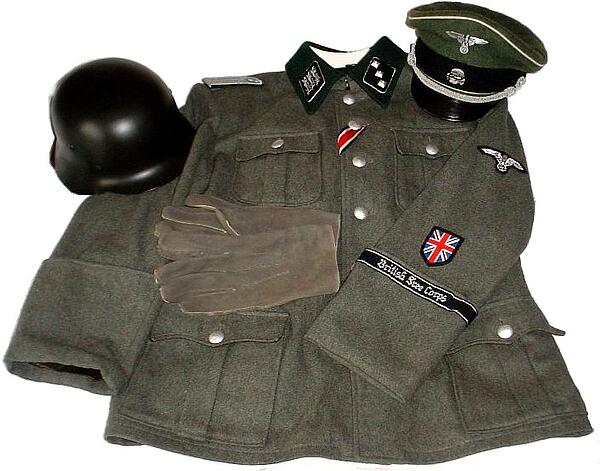British Free Corps
The British Free Corps was a unit of the Waffen SS during World War Two. It consisted of British and Dominion Prisoners of War who had defected to the Nazis and was formed in 1943. Although the unit played only a small part in the war, the BFC did play a role in the Nazi propaganda effort. Its founder, John Amery, carried out English language radio broadcasts for Nazi Germany and was the only member to be charged with treason and hanged after the war.
John Amery was born on 14 March 1912. After a wayward childhood, he tried to make a living in the film industry. He failed abjectly and by 1936 was bankrupt. Amery moved to France, where he met the French fascist Jacques Doriot. Despite his money troubles, Amery was trenchantly anti-communist, and the pair became well acquainted. Amery lived in France during the early years of the war.
Amery was convinced that the West faced a Jewish or Soviet plot to overthrow Western civilisation. In Berlin his views were broadcast, where they were picked up by the son of a British Government minister who openly support the Fascist cause. Joseph Goebbels, the German minister of Propaganda, who seized the opportunity for a resounding propaganda coup. In 1942 Amery was invited to visit Berlin.
After his arrival in October 1942, he made a number of broadcasts for the 'New British Broadcasting Station'. He was also sent to Paris to make contact with pro-Nazi Frenchmen. A small number of Frenchmen had joined the 'Foreign Legions’, comprised of non-Germans fighting for the SS. Amery decided that a British version of the Foreign Legions should be created to fight against the Russians. He wanted to name this British anti-Bolshevik force the British Legion of St George.

In April 1943, the Nazis gave Amery permission to raise a brigade of 1,500 men, who would be recruited from Prisoner of War and internment camps. Amery immediately started his recruiting campaign. In Paris, he promised internees immediate release from prison if they joined his Legion. This campaign was a disaster, and Amery was heckled by the audience. Amery only managed to find one volunteer in his first recruitment drive: an academic from Paris who was to old to serve. Amery failed so spectacularly that the Germans quietly returned him to Berlin.
By May 1943, Nazi officials started to take a more active role in the recruiting campaign. Nazi propaganda chiefs believed the idea was worth pursuing. With Amery sidelined, they managed to reach thirty recruits by June 1943.
The Nazis renamed the unit the British Free Corps in late 1943. Corp members were given their own distinctive uniform. The colour of the military jacket was German field grey: the left arm was emblazoned with a Union Jack and the words ‘'Britische Freikorps' and the collar was embellished with three lions.
The British Free Corps were reduced to chaos when the Allies landed in Normandy in June 1944. Most members had joined to stop the spread of Bolshevism, and would therefore only be in combat with the Russians. The Nazis had to promise the members that they would never have to fight against fellow Britons. The handful of members were moved to the Eastern Front where they served very little purpose.
At the end of the war the known British Free Corps members were rounded up and arrested. Several men claimed that they had joined up in order to sabotage the unit from within. Some members were given jail sentences and others were released after questioning.
Towards the end of the war, the Nazis gave up on Amery. He was captured in Northern Italy and charged with treason - a trial that was extremely well-publicised. Amery initially tried to defend his actions, but on the first day of his trial performed a remarkable volte face and amazed the court by pleading guilty to treason. He was sentenced to death, and on 19 December 1945 was executed at London’s Wandsworth Prison.
See also: Waffen SS
MLA Citation/Reference
"British Free Corps". HistoryLearning.com. 2026. Web.
